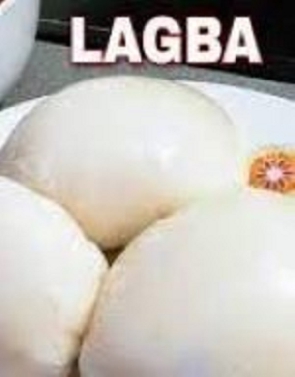Lagba is a solid food that can be found in the Ghanaian Yoruba community. What a typical contemporary Nigerian Yoruba/Nigerian will call swallow or typical Yoruba indigene will call ‘okele’.
The reason why I said Ghanaian Yoruba is because most Yorubas in Nigeria do not know the food called Lagaba. Unless Ghanaian Yoruba in the southern part of Ghana is more aware of this food and it's served during events.
Who are the Ghanaian Yorubas?
History
In the early nineteenth century, pockets of Yorubas from the former Oyo Empire and its environs moved to the Gold Coast in quest of adventure and new habitation. Others travelled with the intention of trading. Around 1813, the first Yorubas came to the Gold Coast.
Along the way, some Yorubas joined up with Nigerians from Kano. These Northerners preferred the north of Ghana and settled there while the Yorubas and their leader Chief Brimah I and his company continued as a spiritualist had advised them till they got to the sea at Accra. They initially settled in such places as Accra, Kumasi and Sekondi before moving to the northern part of the Gold Coast, especially Tamale, Wa, Lawra and Nandom.
Hundreds of Yorubas immigrated to Ghana in the early nineteenth century, and many more are first, second, and third-generation citizens. The Yorubas constitute an important component of Ghanaian society. Some have lived here for so long and for so many generations that the younger generation scarcely speaks Yoruba. Most, however, are fluent in three or more languages: Yoruba, Hausa, Twi, English, and Ga. They flip from one language to another during interactions.
The Yorubas can be found in Accra Newtown which was then known as Lagos Town. Lagos Town was predominantly Yoruba settlers who couldn’t find a place of abode in the central business district and as a result, moved to start a new township called Lagos Town during the Nkrumah era because most of the then immigrants from Nigeria decided not to support the Nkrumah government, but rather Busia’s government, a decision the Yorubas will regret because of alien compliance order 1969 which led to over 5 millions of foreign nationals to be expelled from the country. This led many Yorubas to lose their money and property.
Nkrumah decided to change the name to Accra Newtown as a “punishment”. Lagos Town became the new early settlers stationed after the first generation of Yoruba settled in the Ga Mashie areas plying their business within the surroundings of Okaishie popularly known as Makola which has an identical market name in Lagos State, which it’s indigene are Yorubas.
Makola or Okaishie in the Central Business District has the Palace of the Yoruba Chief, who is The Brimah and the Alawaiyes whose family are also part of the early business family settlers/ traders in the then Gold coast now Ghana.
The Okaishie also houses the Yoruba Central Mosque and Houses Yoruba chief Imam's office.
The Yoruba have been able to integrate with the Gas and because of their contribution towards the development and peaceful co-existence with Gas in Accra, their chiefs have been recognized to join the Greater Accra Regional Council of Chiefs.
The Preparation of Lagba
The Lagba food which is made out of rice is one of the delicious food that cannot be missed during a Yoruba occasion/ event in Ghana. This food is mostly popular with Ghanaian Yorubas in the southern part of Ghana.
How to get flour to prepare Lagaba
The Lagba is prepared from rice flour. This flour is gotten from grinded rice when you want to prepare it for events or a large gathering.
How to Prepare Lagba
I. Put water on fire
II. Let it boil and fetch some so that when it hardens when stirring you can use to soften it
III. Pour the flour till you think it is enough to mix with the water
IV. Stir till it becomes solid, one needs to stir gently whiles you add flour
V. When it is well mixed with the hot water, stir till it hardens
VI. Add the fetched hot water whiles when need be to make get a soft texture
VII. You stir it till you get the right desire
Another option has been the use of a blender
I. The rice is soaked for a period of about 30 mins or until the rice is soft to blend
II. The water is thrown away
III. The rice is poured into the blender
IV. Add water to the rice to attain a watery substance
V. When done pour into a pot on fire
VI. And stir to get a solid outcome
VII. And start stirring it to attain the desired result
NB. Do not put water into the pot before placing it on fire rather the liquid substance from the blender will be useful and please stir gradually when pouring into the pot to get the desired solid texture with lump.
The dish can be served with any soup example ewedu ‘ayoyo’, egusi soup. It is served during a joyful occasion because this food was popular among mostly Yoruba Muslims in Ghana despite being now served among all the Yoruba religious faithful.
How Popular is the Food?
The Lagba despite it being a Yoruba food, it is interesting to know that it was not originated from Nigeria but rather from Ghanaian Yoruba communities. Yes, I know it is very interesting and shocking. A typical Yoruba from Nigeria doesn’t know what is Lagba.
This food is popular with Ghanaian Yorubas in Ghana and it is served on special occasions and can be prepared in the house as a meal for the family to enjoy.
Brief History Of Lagaba
Before the use of rice to prepare Lagba, it started with corn like the northerners' tuo without the mix of kokonte flour which gives it a brownish color, it was popular food among Yorubas in Ghana but not known or titled as occasional food.
Some Ghanaian Yorubas believe this food was inverted in the 1980s when there was famine or shortage of maize in the country, out of creativity the Ghanaian Yoruba in the country decided to ground the rice and prepare solid food out of rice which Yorubas will call ‘okele’/a Nigerian will call swallow.
It came out good and it was delicious.
Some Ghanaian Yoruba also believe that it was out of ‘show’ affluent by the Yoruba Nigerians in Ghana to use rice which was expensive for their meal as a substitute for corn when then Ghana was experiencing famine in the 1980s.
But strangely the Lagba which was started by using Uncle Ben’s rice at that time, the expensive brand of rice couldn’t preserve the food for long but the use of cheap or Ghanaian local rice preserved the food longer. One popular branded sack rice which comes readily to mind is elephant rice. It preserved the food longer and can go 3 days without going bad in wrap rubber unlike perfume rice or foreign rice.
Despite there have been improvements or creative ways of preparing the food like the use of corn dough to mix with rice flour on fire while preparing the food to make it heavy and give it a texture like that of banku or use the blender to blend moist rice, add more water to have liquid to prepare Lagba on fire.
It’s Popularity And Commercialization
Lagba is now popular among the settlers or neighbourhood of Yorubas in Ghana.
There is no Yoruba occasion one will attend in Ghana and Lagaba won’t be served.
There and non-Ghanaian Yoruba who on such occasions look forward to enjoying that meal over any other meal at the occasion but unfortunately you may be disappointed not to enjoy this food at a Muslim Ghanaian Yoruba occasion but any other merry-making of a Ghanaian Yoruba note that when one sees a whitish solid food wrap in white rubber being served that is Lagba and don’t forget to try and you will look food to enjoy more next time.
If the right rice is used to prepare the Lagba, note that it can be preserved for at least 3 days if it is not put into the fridge; but if it is preserved in the fridge it can go for 7 days.
If the rice used is not of a quality nature for lagba, it will not go beyond the next day and the sign it will show its watery texture by being soft and can’t be solid enough despite being mixed with corn dough, it may help on the day of the occasion but it still cannot last beyond that day.
The right rice for Lagba does not necessarily need corn dough to make it solid but it comes as a luxury and it is preserved longer if there are leftovers or excess.
Lagba has become the occasional food in the Zongo community where mostly foreigners settle with the locals and it is also a dish now being sold at local Zongo joints in the Zongo community. It is nice to see the Ghanaian Yoruba contributing towards Ghanaian delicacies and also it is being commercialized.
Health Pre-caution
The food is not heavy in nature but its starchy or carbohydrate nature of the food makes the food worrisome for people who are diabetic and eating it very late cannot be healthy for a diabetic person, it is light if it is not mixed with corn dough.
LifeStyle of Thursday, 2 February 2023
Source: Saheed Lawal













